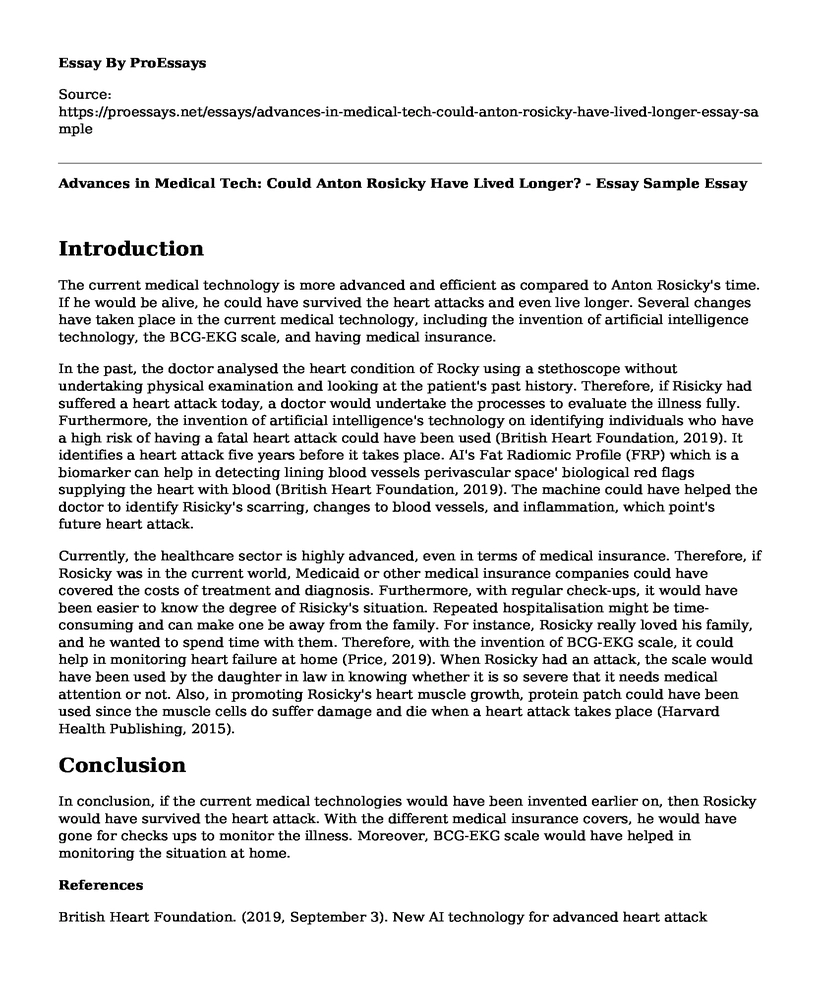Introduction
The current medical technology is more advanced and efficient as compared to Anton Rosicky's time. If he would be alive, he could have survived the heart attacks and even live longer. Several changes have taken place in the current medical technology, including the invention of artificial intelligence technology, the BCG-EKG scale, and having medical insurance.
In the past, the doctor analysed the heart condition of Rocky using a stethoscope without undertaking physical examination and looking at the patient's past history. Therefore, if Risicky had suffered a heart attack today, a doctor would undertake the processes to evaluate the illness fully. Furthermore, the invention of artificial intelligence's technology on identifying individuals who have a high risk of having a fatal heart attack could have been used (British Heart Foundation, 2019). It identifies a heart attack five years before it takes place. AI's Fat Radiomic Profile (FRP) which is a biomarker can help in detecting lining blood vessels perivascular space' biological red flags supplying the heart with blood (British Heart Foundation, 2019). The machine could have helped the doctor to identify Risicky's scarring, changes to blood vessels, and inflammation, which point's future heart attack.
Currently, the healthcare sector is highly advanced, even in terms of medical insurance. Therefore, if Rosicky was in the current world, Medicaid or other medical insurance companies could have covered the costs of treatment and diagnosis. Furthermore, with regular check-ups, it would have been easier to know the degree of Risicky's situation. Repeated hospitalisation might be time-consuming and can make one be away from the family. For instance, Rosicky really loved his family, and he wanted to spend time with them. Therefore, with the invention of BCG-EKG scale, it could help in monitoring heart failure at home (Price, 2019). When Rosicky had an attack, the scale would have been used by the daughter in law in knowing whether it is so severe that it needs medical attention or not. Also, in promoting Rosicky's heart muscle growth, protein patch could have been used since the muscle cells do suffer damage and die when a heart attack takes place (Harvard Health Publishing, 2015).
Conclusion
In conclusion, if the current medical technologies would have been invented earlier on, then Rosicky would have survived the heart attack. With the different medical insurance covers, he would have gone for checks ups to monitor the illness. Moreover, BCG-EKG scale would have helped in monitoring the situation at home.
References
British Heart Foundation. (2019, September 3). New AI technology for advanced heart attack prediction. Science Daily. Retrieved from https://www.sciencedaily.com/releases/2019/09/190903101451.htm
Harvard Health Publishing. (2015, December). 5 new cardiac technologies to watch. Harvard Health Publishing. Retrieved from https://www.health.harvard.edu/heart-health/5-new-cardiac-technologies-to-watch
Price, S. (2019, September 20). New technology could monitor heart failure in the home. Health Europa. Retrieved from https://www.healtheuropa.eu/new-technology-heart-failure/93474/
Cite this page
Advances in Medical Tech: Could Anton Rosicky Have Lived Longer? - Essay Sample. (2023, Apr 24). Retrieved from https://proessays.net/essays/advances-in-medical-tech-could-anton-rosicky-have-lived-longer-essay-sample
If you are the original author of this essay and no longer wish to have it published on the ProEssays website, please click below to request its removal:
- The Relationship Between Unemployment, Physical Health, and Mental Health
- Essay Sample on Hospital Versus Home Births
- Essay Sample on Pharma Industry: Stereotypes & Stakeholder Perceptions
- Paper Example on Fall Prevention in Older Adults: Assessing the Economic Burden
- Paper Example on EMR Revolution: Transforming Quality of Behavioral Healthcare
- Essay Sample on Equal Health Care for All: Addressing the US Health Equity Issue
- Remote Area Nurses: Prevalent Victims of Occupational Violence Paper







